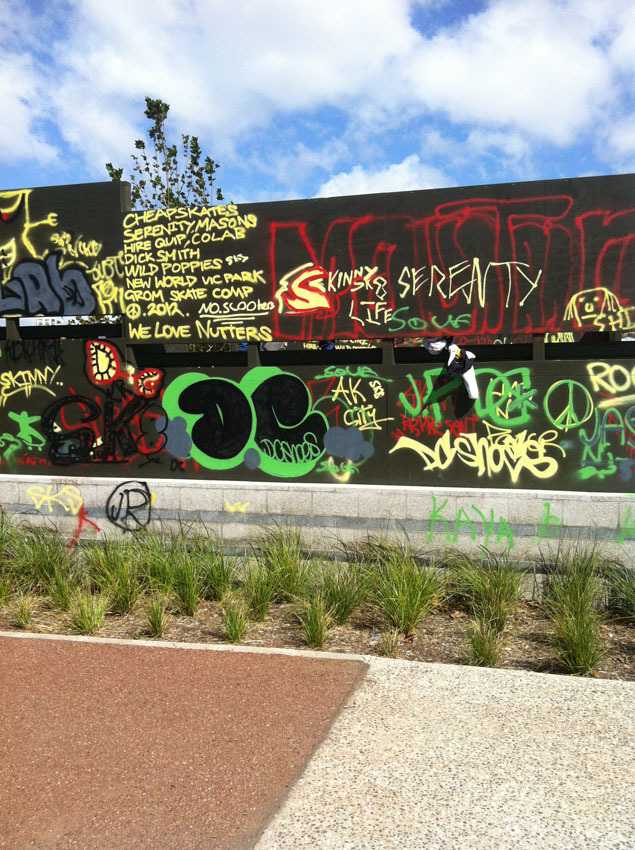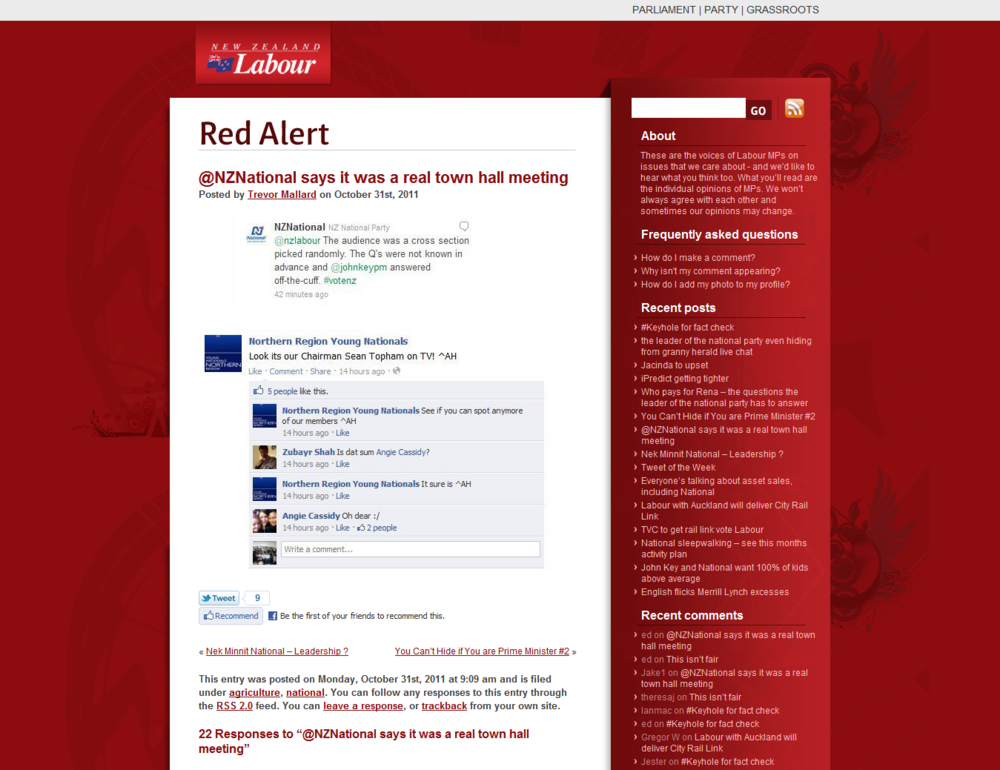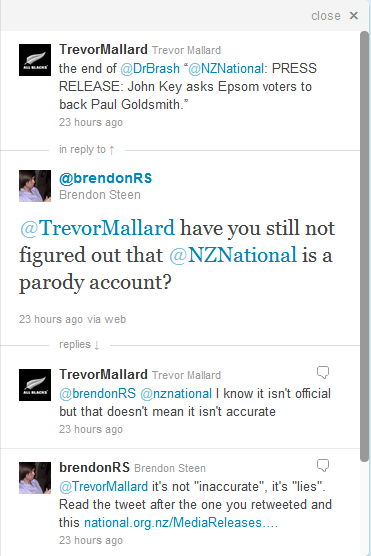The discussion around Teagate (or #teapartytapes, or whatever) is fascinating. There’s a whole bunch of issues, all which get mixed up and attacked and defended in different ways. I’ve expressed a handful of opinions in blog comments etc, but here is my current thinking…
Summary
If you’re somehow unaware of the whole situation it goes like this – John Key wants to endorse John Banks in Epsom, giving National voters the okay to give their electorate vote to Banks over National’s Paul Goldsmith, but it would not be the done thing to simply say that.
So the obvious answer is for The Johns to get together for a cup of tea (why not coffee or a beer?) shake hands, pose for photos and drop a couple of little soundbites.
On Friday the 11th of November (11-11-11!!!!!) they made this happen. It was a very unauthentic event, with at least a couple of dozen journalists swarming around the cafe, along with DPS police, aides, campaign staff and a few unlucky patrons.
It went roughly as you’d expect the pair order their tea, sat down at a table, answered some media questions and made small talk. Then, unexpectedly according to media who were present, the reporters were all ushered outside to give The Johns some time alone.
Key and Banks emerged a little bit later, made the predictable statements with the Prime Minister endorsing Banks without endorsing him, or something. All done.
However it turns out that their alone time wasn’t all their own. A cameraman shooting video for APN/nzherald.co.nz had accidentally left his radio mic on the table, in a small cloth bag and had inadvertently recorded audio of their conversation.
That audio was given to the Herald On Sunday who then ran a story about having the audio but didn’t publish it. Claiming in their headline that the PM “blocked” the publication (a stretch) and also saying that their legal advice said they could publish it, and that it was of public interest. But they didn’t publish it.
John Key was none to pleased, while insisting there was nothing interesting on the tape he also objected loudly to the whole incident and compared it to the actions of the News Of The World.
So, onto some of the issues…
Accidental Recording
We don’t know the specifics of the gear involved, but we do know that what was in the bag was a radio mic. It transmits audio to a receiver attached to a recorder, in this case the video camera used by the cameraman. In typical configuration it will have a sensitive omni-direction mic attached and will be able to transmit a signal a hundred metres or more in good conditions.
There have been a few assertions made about how it came to be on the table in a small fabric pouch, however in an interview with Radio New Zealand (MP3) he explained the situation, saying that as other media started to ask the pair question he had been in a hurry to place a mic to get good audio. This seems plausible – either way he’d have been putting the mic down on the table rather than attaching it to the shirt or tie of one of the men as would be optimal, the bag would make very little difference to the quality of the audio and it’s certainly quicker to just switch it on and chuck it down on the table.
According to his account he was unable to get good camera position near the table and moved back for another angle. The media were then ushered out of the cafe quite quickly and he rushed to the window to get a good position there.
Apparently he only really discovered that he had the audio of their private conversation when he got back to his office. He claims not to have really listened to it, just to have checked the start and end, then given it to the HoS.
In the interview he was questioned a few times about whether they asked for it or paid him for it. He said no on both counts. This is totally reasonable – his relationshp with APN would be on spec. He shoots for them then offers up the content, if they like it and use it then he’ll get paid. They don’t pay to see what he’s got, and they don’t pay for what they don’t use. While he’s unclear how and why he gave the audio to them, they will have paid for any video of his they have used from the event.
Continual Recording and VU Meters
The point has been made by many anonymous experts on the web that he’d never have continued recording for the whole 8-9 minutes of conversation unless he’d known that he was getting the audio, and that he had to know because modern cameras have VU meters displayed on the viewfinder.
I’ve worked with a lot of camera operators over the years, and I’ve even shot at news events myself. While most would probably stop and start recording while picking up b-roll (or cutaways if you prefer) there are also others who tend to roll the whole time – this makes it easier to react to anything that happens suddenly. With file-based cameras this is especially likely as it it can be a lot easier to scrub through one big clip in the your editing software than deal with a lot of little ones.
As an editor I tend to encourage camera operators I work with not to create more clips than necessary when shooting on file-based formats. If they are moving around a small area picking off various shots then I’d have no problem with having the camera movement recorded.
The VU meters is a red herring somewhat. Yes most cameras feature, but they can usually be switched off and even so they don’t really do much to tell you what you are recording, only that you are getting audio. Most news shooters will monitor with headphones rather than pay attention to what VU meters may show, and while gathering video that doesn’t have important audio (such as the afore mentioned cutaways) it’s entirely possible they’d take their headphones off.
So yes, it’s a little unusual that he’d have recorded for 8-9 minutes uninterrupted unless specifically trying to record something that whole time, but it certainly not impossible or even all that unusual for some people. It’s worth considering he edits his own stuff, which makes it a lot easier to quickly jump through extra bits to get to the good stuff.
I don’t think the VU meters argument holds much water. May not be enabled, and very easy to overlook or ignore even if they are on. Also don’t provide any meaningful information about what is being recorded.
Tabloid Journalism
National’s Steven Joyce said “there are a number of inconsistencies in the story which together suggest an attempt to conceal a deliberate News of the World-type covert operation” on behalf of the Herald on Sunday.
I simply don’t think that’s even remotely plausible. No one knew ahead of time that Key and Banks were going to send the media out of the cafe for part of their meeting. And even if they did, a small bag on the table in plain sight is hardly covert, and it seems impossible that anyone would put that on the table and assume it would be allowed to stay there. If your plan hinged on that it would seem doomed to failure.
At most I think this whole situation is a lucky accident on behlaf of the cameraman. Maybe he knew he was recording, maybe not, but he certainly can’t have planned ahead of time to make that recording. He didn’t know the opportunity would arise, and certainly couldn’t count on his bug being left on the table.
A Private Meeting
While in general I don’t really think it’s polite or reasonable to record people without their knowledge, it is equally foolish to conduct a private and potentially sensative conversation in a public venue with bystanders nearby and dozens of media inches away behind a window.
The Crimes Act is pretty clear about what constitutes Private Communication for the purposes of inte
rception, and it’s defined as such:
private communication—
(a) means a communication (whether in oral or written form or otherwise) made under circumstances that may reasonably be taken to indicate that any party to the communication desires it to be confined to the parties to the communication; but
(b) does not include such a communication occurring in circumstances in which any party ought reasonably to expect that the communication may be intercepted by some other person not having the express or implied consent of any party to do so.
(Section 216A, Crimes Act)
Paragraph b is the key one there. For the purposes of the law it seems that it would not be considered private if either party should reasonably expect that it could be intercepted (which in the law means recorded, or listened to) by a third party.
Given there were dozens of invited members of the media within a metre on the other side of the glass as well as members of the public and staff inside the cafe it seems highly likely, unless they were whispering, that it would be reasonable to assume they could potentially be overheard.
So while recording them may have been highly questionable (accidentally or otherwise) it seems to me that the conversation may well not be considered private for the purposes of Section 216B of the Crimes Act anyway.
If You’ve Got Nothing To Hide…
Some people, including the Green Party, have basically said that if The Johns do in fact have nothing to hide in their conversation then they should be happy to release it. I have a huge problem with this argument. It’s exactly the same arguement that’s made to support unreasonable searches as well and it’s highly offensive then.
John Key, if he feels that he’s been wronged, has every right to pursue any and all remedies, regardless of the importance or sensativity of the conversation in question. To suggest that his objection to the recording and it’s publication is proof that he has something to hide is very flawed and exactly the behaviour that we object to when exhibited by the government or it’s agents.
Police Investigation
John Key has complained to the Police about the incident and they are investigating. This is really interesting. Surely now being the subject of a criminal investigation makes it even harder for anyone to publish the recording, but the flip side of that is that if the Police decide that there is no case to answer then it’s a green light for the Herald on Sunday.
It will come down, I guess, to how long that investigation takes. Presumably it could hinge on interviewing various people, perhaps even John Banks – meaning that he could potentially delay the investigation by being unavailable.
How long would the investigation have to last to be effective in killing the story? The election is in less than two weeks, but maybe a week would be enough to take the teeth out of the story? Hard for the media to keep up interest in an off limits item for that long.
Of course the Herald on Sunday could double down an publish anyway. It’s no more an offense to publish while the Police are investigating than it would be to do so anyway – so if they thought they were clear yesterday and still believe they are then nothing changes really.



